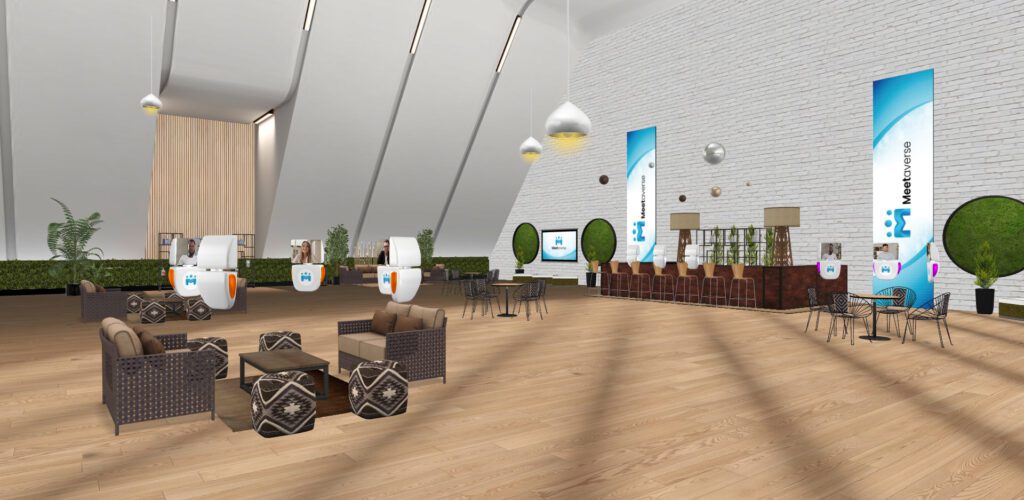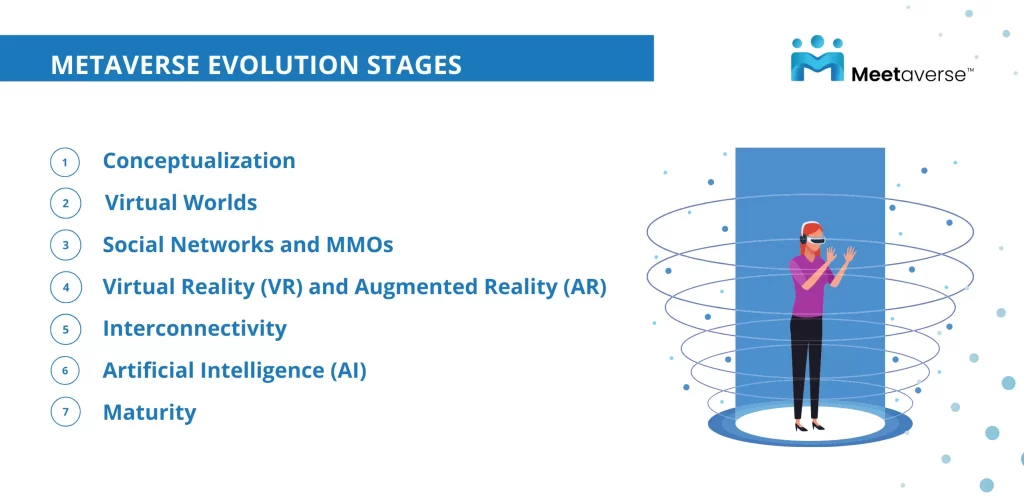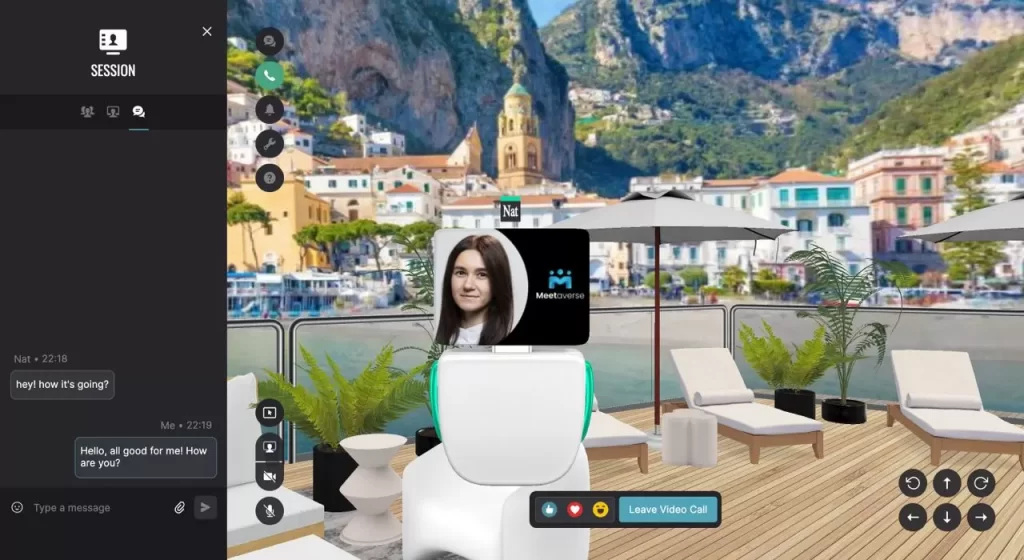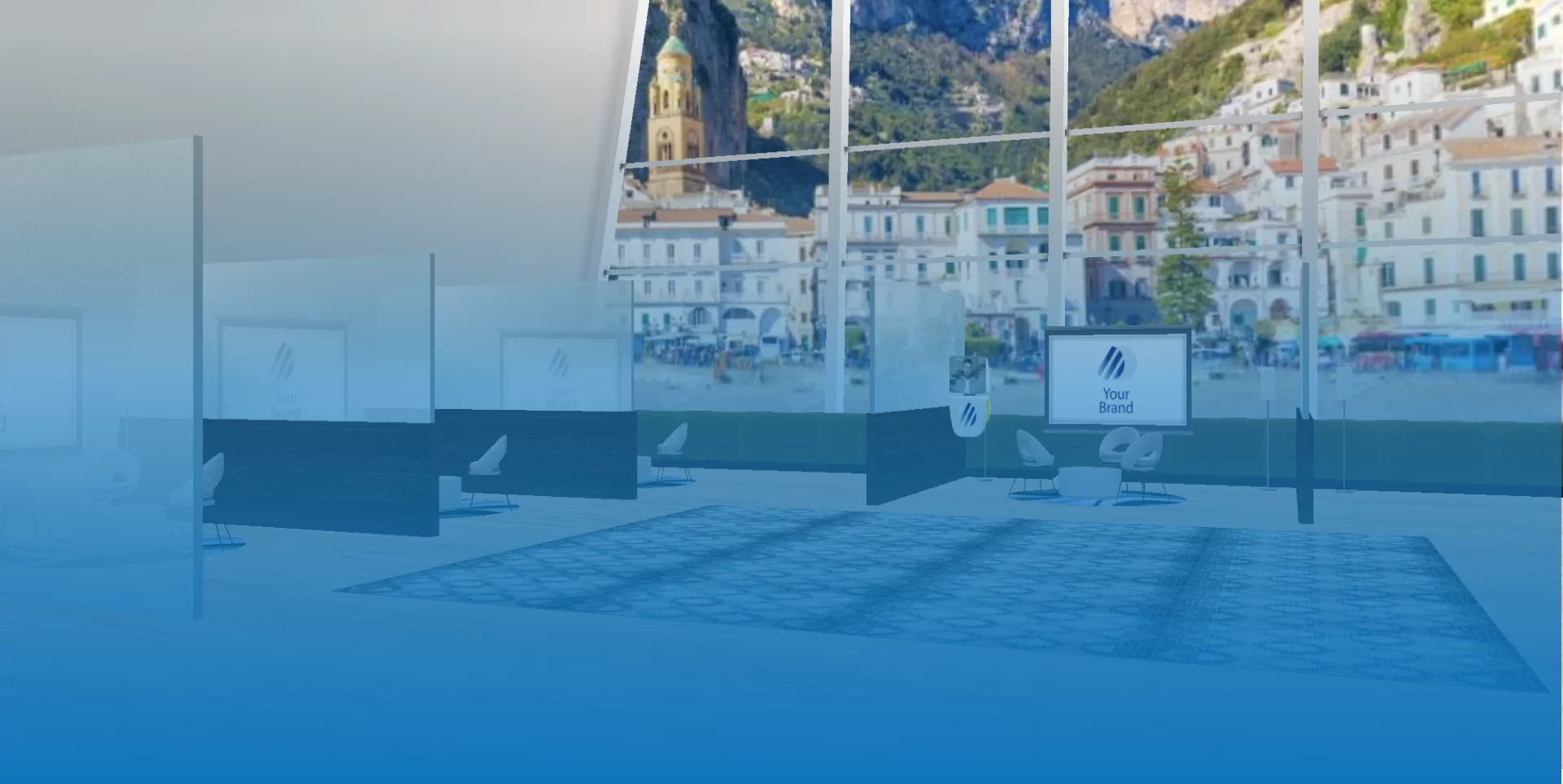
The onset of the metaverse is valuable because it gives us context for what’s next. The metaverse is not a revolution, but the evolution of online environment. One of the most important ideas is that the metaverse is evolving in phases, and that’s why it’s confusing.
Science fiction and tech fans have known about the metaverse for a while, but it didn’t hit the mass market until Mark Zuckerberg mentioned it. The evolution of the metaverse is marked by the continuous advancement of virtual technologies, integration of immersive experiences, and the expansion of interconnected virtual spaces, leading towards a more immersive and interconnected digital universe.
Metaverse implementation in business enables companies to leverage immersive virtual experiences, global connectivity, and innovative technologies to transform their operations, engage customers, and drive growth.

The metaverse is a virtual space accessed either via your computer or through a headset, where individuals interact with each other as well as with digital elements, revolutionizing the way we connect and experience the digital world.
In the metaverse business, businesses can create immersive virtual experiences for customers, enabling them to explore products and services in a dynamic and interactive manner.
It also presents opportunities for companies to host virtual conferences, meetings, and collaborative sessions, transcending geographical limitations and fostering global connections by creating unique metaverse layers.
Have you ever heard this phrase: Does the metaverse exist yet? Some say that the metaverse doesn’t exist, but that really depends on how you define it. We know it does, as the next iteration of the Internet.
The concept of the metaverse was coined nearly three decades ago, but we are still in the early stages of its development. The current limitations in computing power, headsets, software protocols, and network capacity prevent the realization of a fully immersive and shared metaverse.
However, this future is on the horizon, as it represents the culmination of a continuous trend of integrating innovative technologies into a unified whole.
There is no capital “M” metaverse yet with universal protocols that every organization follows to play together. The metaverse is a still-evolving concept, continuously developing and advancing as technology progresses and new innovations emerge.

The emerging metaverse, characterized by exploration, innovation, and early adopters, offers collaborative content and experiences through lowercase “m” metaverses or “miniverses”, “microverses”, which are closed but persistent systems where continuous activity takes place, allowing real-time interactions and 24/7 engagement.
Examples of persistent digital content in miniverses include MMORPGs, Google Maps, Pokémon Go, Sandbox Games, and Snap’s City Painter Local Lenses. In the advanced stage of the metaverse, there will be a greater understanding and interconnectivity between isolated systems, leading to the convergence of new technologies.
There are seven layers of the metaverse that have contributed to its evolution and led to the advancements we see today:
The initial stage involves the conceptualization of the metaverse as a virtual universe, through works of fiction and academic discussions.
During this conceptualization stage, the focus was on envisioning a virtual universe and exploring its potential. This stage allowed for creative thinking and the development of futuristic ideas that shaped the initial direction of future metaverse development.
It served as a starting point for imagining the possibilities of shared virtual spaces, social interactions, immersive brand experiences, and the integration of technology in our everyday lives.
The emergence of virtual worlds like Second Life and early online gaming environments introduced the concept of immersive digital spaces.
The virtual worlds stage of the metaverse’s evolution introduced immersive digital environments that serve as a precursor to the broader concept. These virtual worlds offer users the opportunity to explore and engage with richly designed landscapes.
They provide benefits such as escapism, socialization, and entertainment, while paving the way for more advanced technologies and the eventual integration of virtual reality, augmented reality, and artificial intelligence.
The integration of social networking platforms and massive multiplayer online games (MMOs) brings people together in shared virtual environments, enhancing social interaction within digital spaces.
The advent of social networks and massively multiplayer online games (MMOs) in the evolution of the metaverse brings significant benefits:
The metaverse benefits from engagement and collaboration within MMOs, offering shared experiences, cooperative gameplay, and virtual economies.
This stage also lays the foundation for future developments, as it highlights the potential for building larger-scale immersive worlds and integrating social networking elements into the metaverse.
Advancements in VR and AR technologies enable more immersive and realistic experiences, blurring the line between the physical and virtual worlds. This stage in the evolution of the metaverse introduces transformative features and possibilities:
These technologies open up a wide range of possibilities for education, training, entertainment, and communication within the metaverse, paving the way for more seamless integration of virtual and physical realities.
Interconnectivity facilitates the smooth integration of diverse platforms, devices, and services, granting users access to the metaverse through multiple entry points.
This stage fosters a cohesive and interconnected metaverse experience, enhancing collaboration, information sharing, and cross-platform interactions.
It opens up possibilities for cross-platform gaming, unified communication tools, and the seamless transfer of digital assets, creating a more immersive and integrated metaverse ecosystem.
The incorporation of AI technologies enhances the metaverse by enabling intelligent virtual entities, realistic simulations, and personalized experiences.
AI technologies enhance the metaverse by enabling intelligent virtual entities, realistic simulations, and personalized experiences. AI-powered algorithms can generate dynamic content, provide realistic NPC (non-player character) interactions, and optimize virtual environments for a more immersive and engaging metaverse experience.
This stage also opens up possibilities for advanced AI-driven chatbots, natural language processing, and machine learning models that enhance user interactions and create a more intelligent and responsive metaverse ecosystem.
The final stage is the maturation of the metaverse, a fully realized digital universe with seamless user interactions, lifelike simulations, complex economies, and extensive social, work, and entertainment opportunities. A fully realized metaverse offers seamless user interactions, where individuals navigate virtual environments with ease.
Realistic simulations within the metaverse enable immersive experiences that closely mirror the physical world, providing users with unprecedented levels of engagement and presence.
XR technologies (augmented reality, virtual reality, and mixed reality) and round-the-clock accessibility will be integral to the mature metaverse, which will be characterized by persistence, decentralization, collaboration, and interoperability. Real-time convergence of spatially oriented content with the physical world will be a key feature of the mature metaverse.
Additionally, a thriving virtual economy emerges in the mature metaverse, where individuals can engage in commerce, trade virtual goods and services, and create new avenues for work and entrepreneurship.

How can Meetaverse help your business?
Leave your contact information and a Meetaverse professional will be happy to tell you more about how we can help
The metaverse presents numerous metaverse opportunities for businesses to explore and capitalize on. Metaverse solutions for business offer innovative tools and technologies to enhance customer engagement, optimize operations, and tap into the growing digital ecosystem for improved growth and success.
Some key business ideas for metaverse include:
1. Virtual commerce: Businesses can establish virtual storefronts and marketplaces, selling digital goods, virtual assets, and experiences in a persistent metaverse.
2. Virtual real estate: Companies can invest in virtual land or properties within the metaverse, creating virtual venues for events, exhibitions, and immersive brand experiences.
3. Virtual advertising: Advertisers can leverage the metaverse to reach a highly engaged audience through in-world advertisements, sponsorships of virtual events, product placements within virtual environments.
4. Virtual conferencing and collaboration: Companies can utilize the metaverse for business meetings, conferences, collaboration, as well as metaverse workspaces offering immersive and interactive experiences that transcend physical limitations.
5. Virtual training and education: As a fusion of the metaverse and business, this technology stands as a robust facilitator for corporate training, academic institutions, and skill development. It provides lifelike simulations and immersive learning settings, reshaping conventional educational and training approaches.
6. Virtual entertainment and gaming: Companies can create and monetize virtual entertainment experiences, such as virtual concerts, immersive gaming experiences, or virtual reality storytelling.
7. Virtual social experiences: Brands can engage with consumers through virtual social experiences, hosting virtual events, gatherings, parties, and interactive social spaces to connect with their audience.
We will now illustrate how to use the metaverse for business and the benefits for business, including:
1. Enhanced customer engagement: Companies can provide immersive and interactive experiences in the metaverse, driving higher levels of customer engagement and brand loyalty.
2. Collaborative workspaces: The metaverse enables distributed teams to collaborate seamlessly in virtual workspaces, fostering productivity, knowledge sharing, and innovation.
3. Cost efficiency: Virtual operations within the metaverse can reduce costs associated with physical infrastructure, logistics, and travel, while still offering impactful business interactions.
4. New revenue streams: The metaverse opens up opportunities for businesses to generate revenue through virtual commerce, advertising, selling in metaverse, virtual real estate, and virtual experiences.
5. Expanded market reach: Businesses can tap into a global audience within the metaverse, transcending geographical limitations and reaching customers from around the world.
6. Innovative marketing channels: Businesses can leverage the metaverse for creative marketing campaigns, immersive brand experiences, and targeted advertising tailored to the virtual environment.
Lead your team into the future. Create a corporate metaverse your entire organization will love. Start working in your own metaverse now with our metaverse enterprise solutions. Navigate, communicate and collaborate in a customized virtual workspace designed to accelerate sales, provide immersive brand experiences, and support remote work environments with seamless digital workplace experience.
Imagine in one room: the sales team is closing another deal. Next door, the marketing team is hosting a product launch event. Across the hall, the HR team is holding a virtual training session. From simple meeting spaces to comprehensive metaverse office environments, customize your corporate metaverse today with Meetaverse.


Metaverse platforms for business are a unique and innovative option to lead a business. Metaverse for small business can and extend their reach, enhance customer engagement, and tap into innovative ways of conducting business in the digital realm.
By leveraging the metaverse, small businesses can create immersive and personalized meeting experiences, build strong connections with their customers, and explore novel marketing strategies, empowering them to thrive in a dynamic and competitive digital landscape.
Start your corporate metaverse with Meetaverse.
Experience it now
How can Meetaverse help your business?
Leave your contact information and a Meetaverse professional will be happy to tell you more about how we can help
Harnessing the potential of the metaverse business landscape, companies can craft immersive retail experiences through 3D virtual storefronts, ushering in a new era of digital commerce.
Leveraging the metaverse business model, advertising and networking become dynamic and personalized, fostering more engaging interactions.
By incorporating metaverse business strategies, conventional work-from-home and education paradigms are transformed into interactive and immersive virtual experiences.
The metaverse opportunity presents an array of benefits for businesses:
For small businesses, embracing business in the metaverse offers the opportunity to expand their reach beyond traditional geographic limitations. It provides an immersive environment for showcasing products and services, thereby enhancing customer engagement.
Further opportunities in the metaverse include immersive advertising, enabling smaller businesses to stand out and capture customer attention. Virtual real estate provides these businesses with a unique digital presence.
Finally, the metaverse fosters innovative networking and collaboration, opening doors to new partnerships and markets.
Businesses can leverage metaverse platforms for business by establishing a unique digital presence, creating virtual stores, offices, or showrooms to enhance customer interaction. These platforms offer a more immersive way to showcase products or services, enhancing the customer’s shopping or browsing experience.
Metaverse and business integration also allows for innovative advertising opportunities. Surely, this capture audience attention in new ways.
Businesses can utilize metaverse platforms for collaborative work environments, fostering better team synergy.
Additionally, the metaverse can be used for creating virtual events or conferences, opening up global networking and learning opportunities.
The metaverse layers brings both opportunities and threats to businesses. Entry costs, accelerated technological changes, and cybersecurity risks pose substantial challenges, especially for small businesses looking to implement business ideas for metaverse.
However, despite the challenges posed by the metaverse, businesses can benefit from its limitless potential for growth, enhanced customer experiences, and new revenue streams.
Unlock the metaverse’s potential for business brands with our detailed gui...
read moreAs organizations move from physical offices to hybrid and digital-first environm...
read moreIn 2024’s metaverse, technology and commerce combine....
read more

